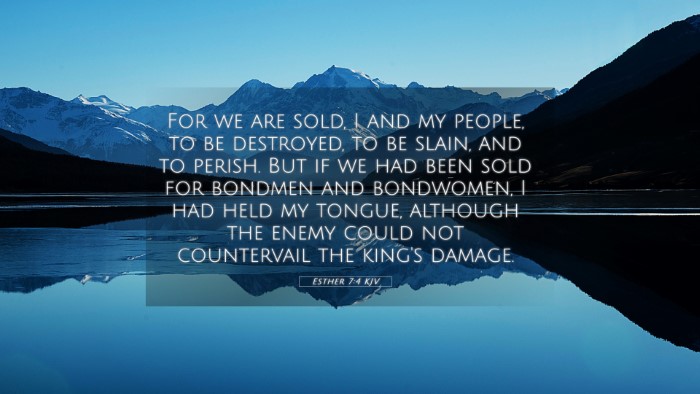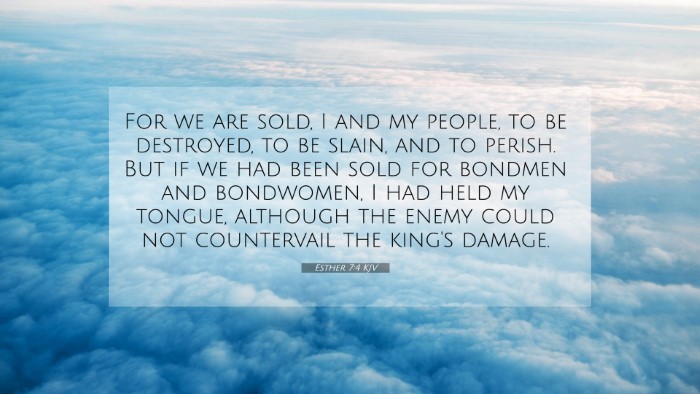Old Testament
Genesis Exodus Leviticus Numbers Deuteronomy Joshua Judges Ruth 1 Samuel 2 Samuel 1 Kings 2 Kings 1 Chronicles 2 Chronicles Ezra Nehemiah Esther Job Psalms Proverbs Ecclesiastes Song of Solomon Isaiah Jeremiah Lamentations Ezekiel Daniel Hosea Joel Amos Obadiah Jonah Micah Nahum Habakkuk Zephaniah Haggai Zechariah MalachiEsther 7:4 Similar Verses
Esther 7:4 Cross References
For we are sold, I and my people, to be destroyed, to be slain, and to perish. But if we had been sold for bondmen and bondwomen, I had held my tongue, although the enemy could not countervail the king's damage.
Uncover the Rich Themes and Topics of This Bible Verse
Listed below are the Bible themes associated with Esther 7:4. We invite you to explore each theme to gain deeper insights into the Scriptures.
Esther 7:4 Cross Reference Verses
This section features a detailed cross-reference designed to enrich your understanding of the Scriptures. Below, you will find carefully selected verses that echo the themes and teachings related to Esther 7:4 KJV. Click on any image to explore detailed analyses of related Bible verses and uncover deeper theological insights.
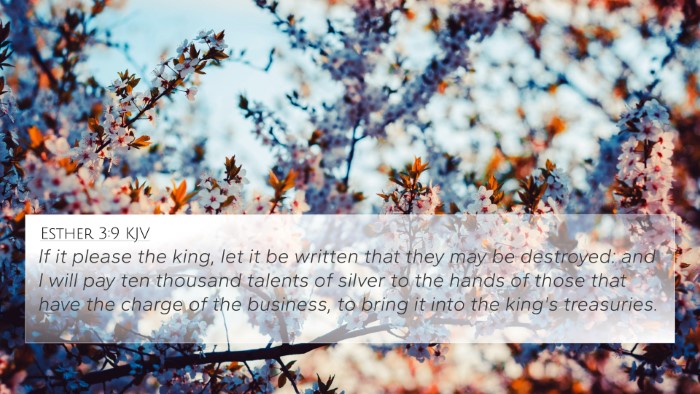
Esther 3:9 (KJV) »
If it please the king, let it be written that they may be destroyed: and I will pay ten thousand talents of silver to the hands of those that have the charge of the business, to bring it into the king's treasuries.
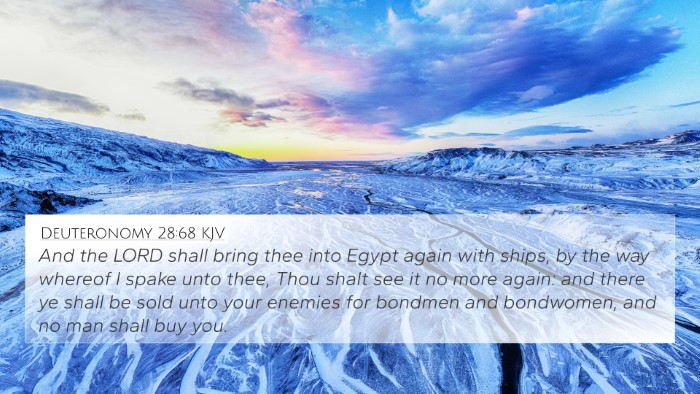
Deuteronomy 28:68 (KJV) »
And the LORD shall bring thee into Egypt again with ships, by the way whereof I spake unto thee, Thou shalt see it no more again: and there ye shall be sold unto your enemies for bondmen and bondwomen, and no man shall buy you.
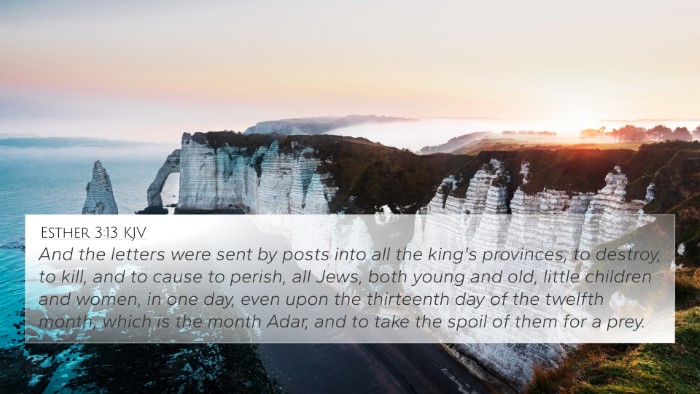
Esther 3:13 (KJV) »
And the letters were sent by posts into all the king's provinces, to destroy, to kill, and to cause to perish, all Jews, both young and old, little children and women, in one day, even upon the thirteenth day of the twelfth month, which is the month Adar, and to take the spoil of them for a prey.
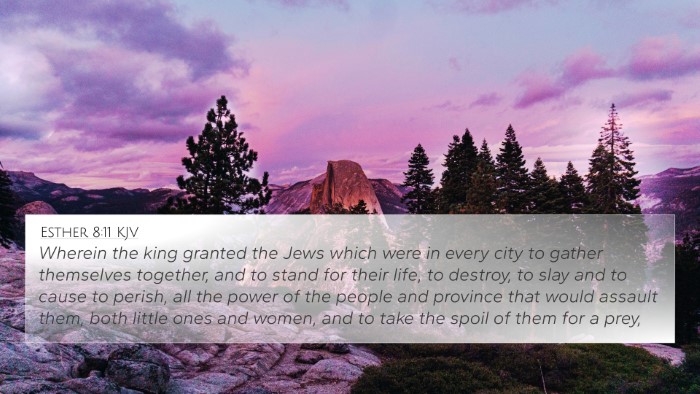
Esther 8:11 (KJV) »
Wherein the king granted the Jews which were in every city to gather themselves together, and to stand for their life, to destroy, to slay and to cause to perish, all the power of the people and province that would assault them, both little ones and women, and to take the spoil of them for a prey,
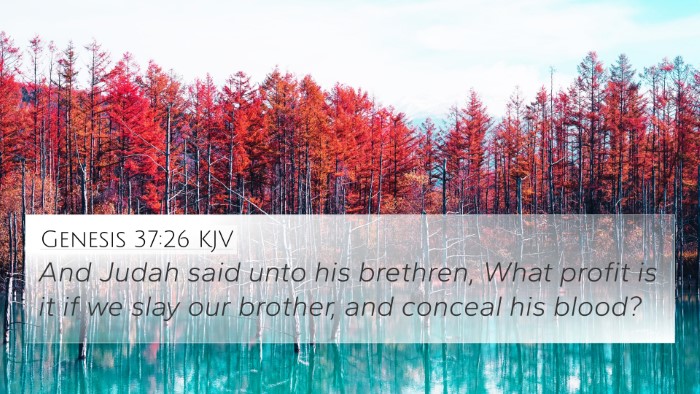
Genesis 37:26 (KJV) »
And Judah said unto his brethren, What profit is it if we slay our brother, and conceal his blood?
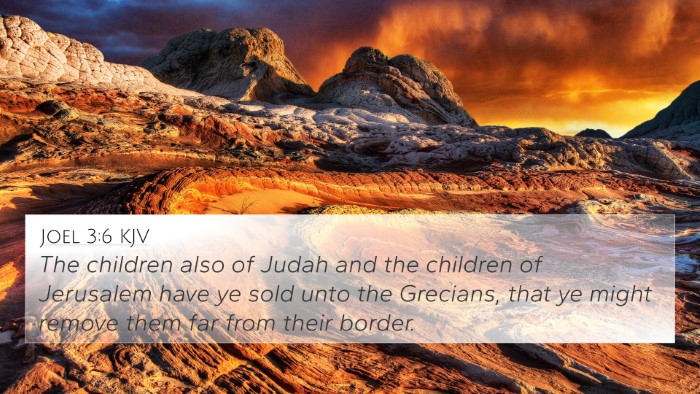
Joel 3:6 (KJV) »
The children also of Judah and the children of Jerusalem have ye sold unto the Grecians, that ye might remove them far from their border.
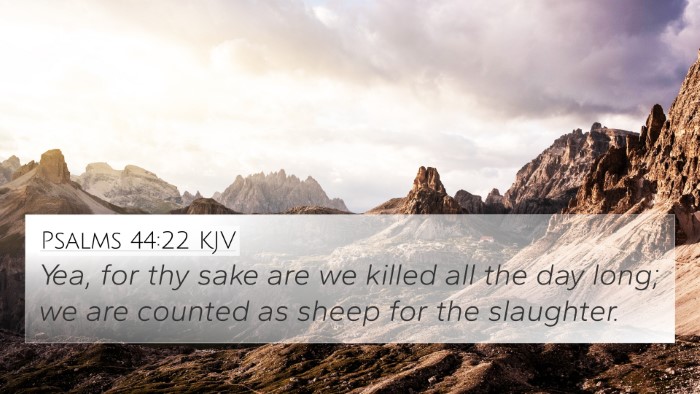
Psalms 44:22 (KJV) »
Yea, for thy sake are we killed all the day long; we are counted as sheep for the slaughter.
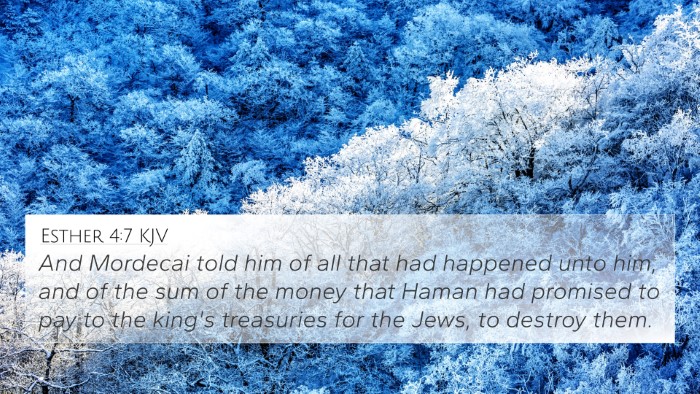
Esther 4:7 (KJV) »
And Mordecai told him of all that had happened unto him, and of the sum of the money that Haman had promised to pay to the king's treasuries for the Jews, to destroy them.
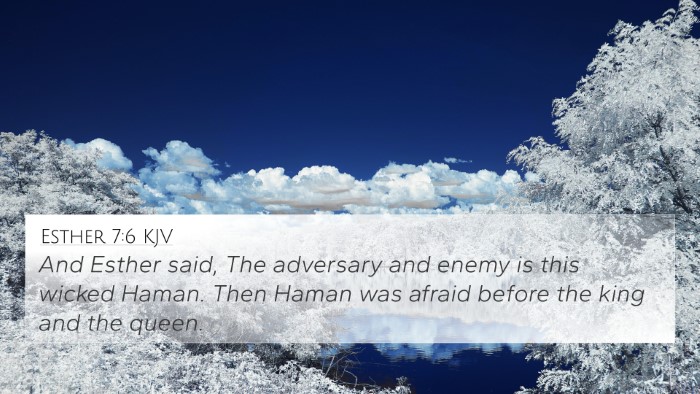
Esther 7:6 (KJV) »
And Esther said, The adversary and enemy is this wicked Haman. Then Haman was afraid before the king and the queen.
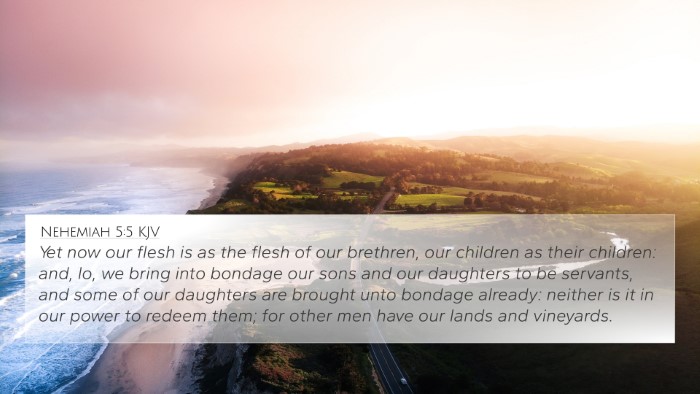
Nehemiah 5:5 (KJV) »
Yet now our flesh is as the flesh of our brethren, our children as their children: and, lo, we bring into bondage our sons and our daughters to be servants, and some of our daughters are brought unto bondage already: neither is it in our power to redeem them; for other men have our lands and vineyards.
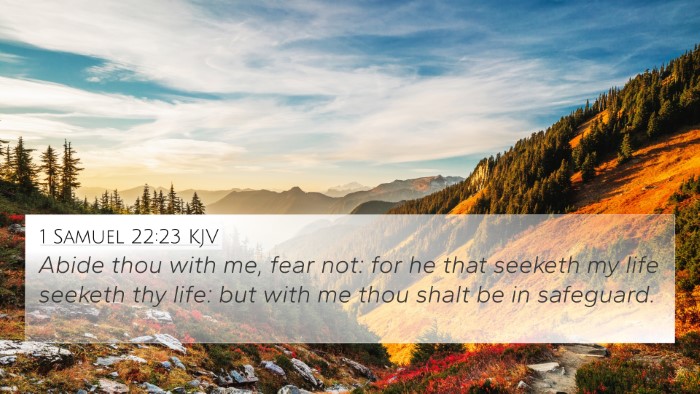
1 Samuel 22:23 (KJV) »
Abide thou with me, fear not: for he that seeketh my life seeketh thy life: but with me thou shalt be in safeguard.
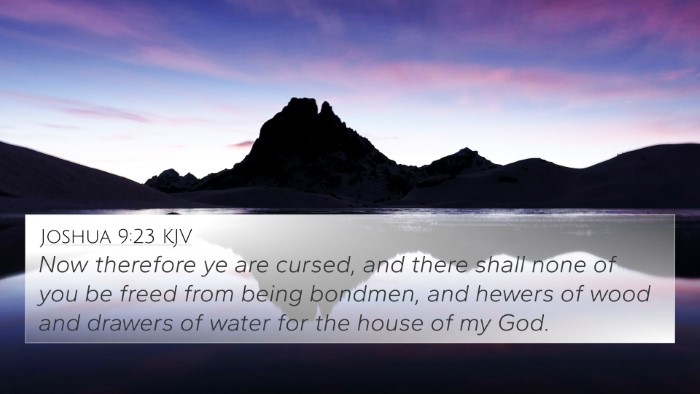
Joshua 9:23 (KJV) »
Now therefore ye are cursed, and there shall none of you be freed from being bondmen, and hewers of wood and drawers of water for the house of my God.
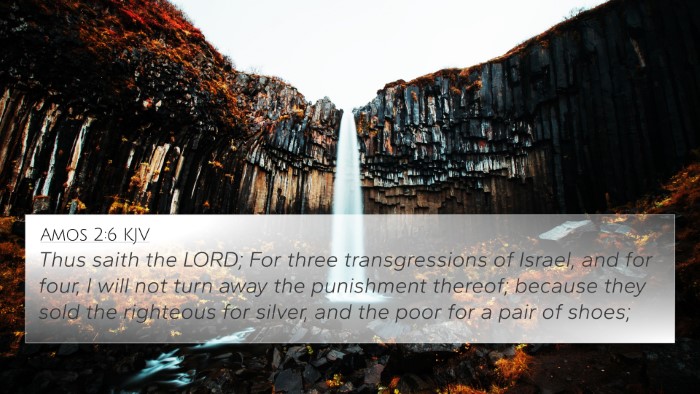
Amos 2:6 (KJV) »
Thus saith the LORD; For three transgressions of Israel, and for four, I will not turn away the punishment thereof; because they sold the righteous for silver, and the poor for a pair of shoes;
Esther 7:4 Verse Analysis and Similar Verses
Understanding Esther 7:4
Esther 7:4 states:
"For we are sold, I and my people, to be destroyed, to be slain, and to perish. But if we had been sold for bondmen and bondwomen, I had held my tongue, although the enemy could not countervail the king’s damage."
This verse captures a poignant moment in the Book of Esther, where Esther reveals her Jewish identity to King Ahasuerus and pleads for her people's salvation.
Summary of Insights from Commentaries
The following insights draw from notable public domain commentaries to provide a comprehensive understanding of Esther 7:4.
Context and Historical Significance
Matthew Henry emphasizes the dire situation in which Esther finds herself. She is addressing the king regarding a significant threat to her people, underscoring that the stakes are not just her life but the fate of all Jews in the Persian Empire.
Albert Barnes notes that Esther's use of the word "sold" indicates complete subjugation. The Jewish people were not merely at risk of death but were subjected to a premeditated annihilation orchestrated by Haman. This highlights the gravity of Haman’s actions and the king’s potential complicity.
Adam Clarke provides a deeper exploration of the thematic elements at play. He suggests that Esther’s plea represents a moment of vulnerability but also of empowerment. By articulating her dire plight to the king, she challenges the royal authority and invokes compassion, which is a critical component of her bravery.
Thematic Connections
Thematically, Esther 7:4 speaks to the concepts of identity, advocacy, and divine providence. This verse acts as a pivot in the narrative, showcasing how personal risk can lead to communal salvation.
Cross-References
- Exodus 3:9 - Parallel of deliverance when God hears the cries of the oppressed.
- Daniel 3:16-18 - Faithfulness in the face of persecution, highlighted through the story of Shadrach, Meshach, and Abednego.
- Psalms 34:17 - Assurance that God hears and delivers those in distress.
- Acts 4:29-31 - Early Christians praying for boldness in the face of threats, reminiscent of Esther’s courage.
- Romans 8:31 - The notion that if God is for us, who can be against us aligns with Esther’s faith in divine intervention.
- Mordecai’s earlier assertion in Esther 4:14 - A prophetic reminder of perhaps Esther’s intended role in salvation for her people.
- Luke 12:4-5 - The importance of fearing God over man, reflecting Esther's journey of faith amid political risk.
Comparative Bible Verse Analysis
When conducting a comparative Bible verse analysis, Esther 7:4 aligns significantly with verses that emphasize the roles of women in salvation history. Esther’s courage parallels the strengths seen in other biblical women like Deborah and Jael, who acted decisively in the face of adversity.
Identifying Connections
This examination of Esther contributes to an understanding of inter-Biblical dialogue, signaling how themes of advocacy and identity manifest across the Scriptures. The strength displayed by Esther in revealing her Jewish identity echoes through texts exploring faith under pressure.
Tools for Bible Cross-Referencing
To delve deeper into Esther 7:4 and its connections, one may explore tools for Bible cross-referencing such as:
- Bible concordances that provide references linking similar themes across scripture.
- A Bible cross-reference guide to help identify relationships between verses.
- Comprehensive Bible cross-reference materials for deeper study into thematic connections.
- Resources that specifically analyze the relationships between Old and New Testament narratives.
Conclusion
Esther 7:4 serves as a profound verse illustrating the challenges faced by those in positions of vulnerability. By understanding its connections with other scriptures, readers gain a richer view of advocacy and divine purpose threaded through the biblical narrative. This verse invites contemplation not only on the historical context but also on the abiding themes of courage, identity, and salvation found throughout the Bible.

